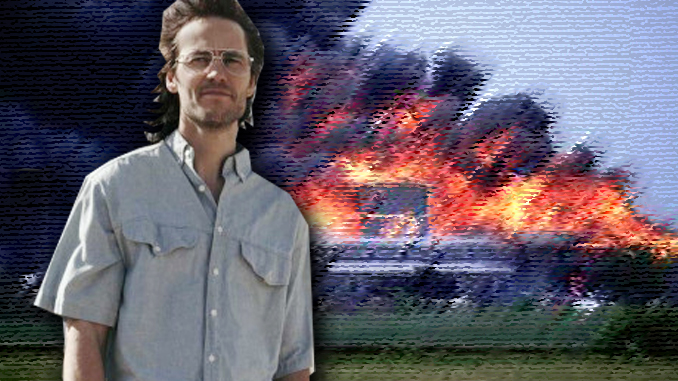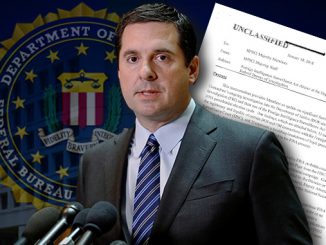
By Donald Jeffries
Netflix, like most of the mainstream media, usually airs predictable, politically correct programming. However, the 2018 miniseries “Waco,” garnering a new popularity due to so many viewers being quarantined, does a shockingly good job of recounting the tragic events that culminated in the deaths of 76 people, including 25 children and two pregnant women, on April 19, 1993.
The FBI, BATF, Texas law enforcement, and the U.S. military carried out an unprecedented joint assault on the group home of the Branch Davidians, a previously little-known sect of Christianity, on Feb. 28, 1993. The massive overkill was at least partially motivated by a desire on the part of the BATF to restore its reputation after the disastrous tragedy at Ruby Ridge, Idaho less than a year previously, where FBI agents killed the son of Randy Weaver and a sniper shot and killed Weaver’s wife, Vicki, while she was holding their small child in her arms at the doorway to their home.
Instead of confronting Davidian leader David Koresh during his regular forays into town, law enforcement chose to stage a show of strength by storming the “compound” (as the group’s home was continually referred to by the mainstream media), with a force that would have been more appropriate for a heavily armed foreign invader. According to the government, Koresh was “hoarding” weapons and also was accused of sexually abusing children. The Justice Department’s own investigation into the sexual abuse allegations uncovered no evidence.
“Waco” does a nice job of portraying Koresh (played convincingly by Taylor Kitsch) and his eccentric character, without unfairly demonizing him. Michael Shannon is especially good as FBI negotiator Gary Noesner, who struggles to be a voice of reason in contrast to his more aggressive colleagues. Macaulay Culkin’s younger brother Rory gives a powerful performance as Davidian survivor David Thibodeau.
The miniseries was based on the books A Place Called Waco by Thibodeau, and Stalling for Time: My Life as an FBI Hostage Negotiator by Noesner. While the press never questioned the government’s unconstitutional actions at the time, this miniseries elicited reactions such as this one, from Forbes: “The over-arching narrative is that we should not trust the government’s record of events, as we see them destroy evidence that they fired first on the cult when they initially got there and they were responsible for the fire that killed everyone, despite that not being the official narrative.”

That is the strongest aspect of this compelling miniseries. The Davidians are depicted sympathetically, and the government is revealed to be at fault for the entire situation. Not much is left out. Viewers are shown how the FBI shut off the Davidians’ water and power, even after begrudgingly delivering milk to them, which subsequently spoiled (the mothers with babies to breastfeed were unable to lactate due to the extremely stressful situation), and the mind-boggling screeching sounds and bright lights that the authorities besieged the Davidians with at night. The program also reveals how the Davidians were denied the opportunity to bury their dead, although the script left out the gruesome fact that a corpse was left hanging on a fence for days, until vultures reportedly devoured parts of it.
The series inaccurately portrays Attorney General Janet Reno, who was fully on board with the militarized assault and diabolical tactics, as being initially opposed to the final attack, which featured armored tanks ramming into the “compound” and pumping it full of CS gas, which had been banned for use in war by the Geneva Convention. Reno, in fact, continued to accuse Koresh of sexually abusing children after his death, even after her own Justice Department’s report exonerated him.
The events at Waco represented a crucial moral line in the sand, crossed by government authorities and the mainstream media. American citizens, who had not harmed anyone or been accused of any tangible crime, were attacked with military-style tactics in their home by a war-like contingent of federal and local law enforcement agents. Among the few politicians critical of the government’s actions at Waco was former pop singer Sonny Bono, then a congressman from California. Bono would go on to die in a suspicious manner, when the accomplished skier allegedly crashed into a tree while skiing on Jan. 5, 1998.
President Bill Clinton, Reno, and the BATF and FBI leaders who devised such an unfathomable strategy and consistently pushed for confrontation over negotiation, were never even charged with recklessness, let alone crimes, for their actions by anyone other than “conspiracy theorists.” Clinton absolved the government of any responsibility, telling the press on April 20 that “The Federal Bureau of Investigation then made every reasonable effort to bring this perilous situation to an end without bloodshed and further loss of life. The Bureau’s efforts were ultimately unavailing because the individual with whom they were dealing, David Koresh, was dangerous, irrational, and probably insane.”
It wasn’t the Branch Davidians who were “dangerous and irrational or even insane.” The Netflix miniseries does a good job of reminding us of this.
Donald Jeffries is a highly respected author and researcher whose work on the JFK, RFK and MLK assassinations and other high crimes of the Deep State has been read by millions of people across the world. Jeffries is also the author of three books currently being sold by the AFP Online Store.




